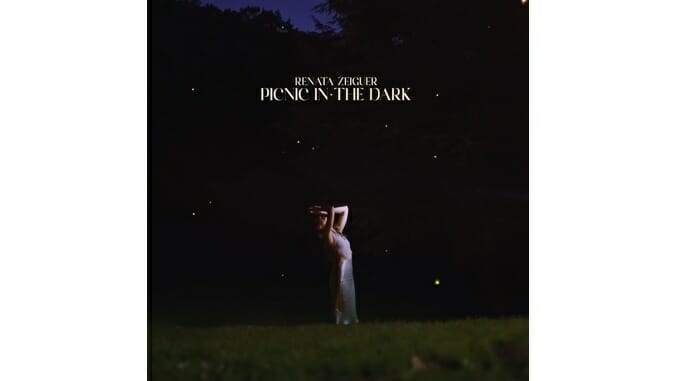Renata Zeiguer Finds the Light by Embracing the Shadows on Picnic in the Dark

“Yeah, it’s Halloween / tonight and every night,” is how Elliott Smith described his attempts to cope with the collateral damage of a difficult childhood: a decorated mask that constantly needs readjusting, hiding wounds yet to heal on a carnival of a night that feels like it exists halfway between a fairytale and the seedy underbelly of human nature. As she began working on the follow-up to her acclaimed debut record, 2018’s Old Ghosts, Renata Zeiguer found herself trapped in the same kind of sparkly limbo, working through dysfunction she’d endured early in life (now fuzzy in the rearview) in order to heal and move on. Picnic in the Dark sees the New York artist (with the help of co-producer Sam Griffin Owens) untangle all things harrowing about the past through creation, allowing us into her nocturnal holiday of dream logic and self-discovery.
Antique drum machines are the listener’s entry point into the dreamworld of Zeiguer’s creation; the ghostly echoes from another time are the first sound you hear on half of the dozen tracks here, including opener “Sunset Boulevard.” The patterns crank up like an old movie camera to show the memory she’s retrieved, harkening back to the work of bossa nova king João Gilberto, whom Zeiguer has cited as a major influence. The romance of the genre rubs delightfully against the winding melody lines that never let us completely relax, like there’s an itch under the rosy surface that’s impossible to ignore. “Oh, but something so familiar / isn’t always right,” she frets over angelic choral sighs and warm guitar lines mimicking her vocal, luring us into a dream that threatens to morph into a nightmare the second we get too comfortable.
A lot of the album hinges on the fine line separating those dreams and nightmares. Straight out of the mellotron-tinged, weightless “Evergreen,” we’re plunged into gothic dissonance with the opening of early highlight “Whack-a-mole,” whose chorus swells back beautifully into the ether before another sharp guitar hit knocks us back down. It’s thrilling to follow the zigs and zags of the atmosphere Zeiguer creates, dutifully walking the non-linear path of healing that her muse guides us along. The record’s strength lies in those sharp turns she takes, acknowledging the jagged edges that exist even in warm memories. The pace she sets pulls you out of time, giving you the space to reassess within her masterful arrangements.
“Time to commemorate / before it’s too late,” Zeiguer coos on “Mark the Date,” one of several tracks that recall the whispery sunshine pop of ‘60s cult songwriters like Margo Guryan and Emmitt Rhodes, blended with bossa nova flair. The need to document pops up throughout the record as Zeiguer urges the listener to handle themselves with care as they revisit those difficult memories they’ve blocked out, making themselves remember. The descent into “Burning Castle,” a semi-psychedelic float through space sprinkled with tip-toeing staccato strings, sees Zeiguer reassure herself that “It’s alright, when the morning comes / I’ll find it,” even as the world she’s known comes crashing down around her in a wash of orchestral chaos.